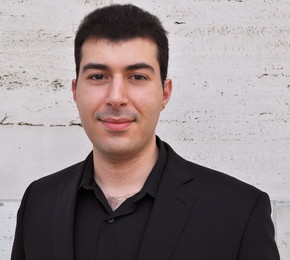Saturday, May 7th, 2016
written by Tim Hansen

A couple of years ago Californian-based composer Saad Haddad was accepted into the prestigious masters program at Juilliard. Like countless young composers before him, it would mean uprooting from home and hurling himself into the maelstrom of New York City. It’s exciting, but tough, and more than one young artist has been left battered by the experience. But someone had Haddad’s back: his uncle Marwan. “Ever since I was very young, he would boast to all his friends and family that one day I would be in Carnegie Hall,” Haddad recalls fondly. It was a no-brainer then that when Haddad had his Carnegie Hall debut at the tender age of 23, he dedicated the work to his uncle.
Manarah was composed for the American Composers Orchestra, supported by the JFund. ‘Manarah’ means ‘beacon’ in Arabic, and it’s an apt title. Two antiphonal trumpets perch above the audience – digitally processed live by Haddad – and lead the orchestra through a glittering microtonal landscape, characteristic of Haddad’s work. However the title is also a loving acknowledgement of the encouragement Haddad’s uncle gave to him from childhood. “It was just so obvious to me to dedicate the work to him,” says Haddad. “He believed in me from the beginning.”
‘The beginning’ was astonishingly early; Haddad had his sights set on a career in composition from age seven (arguably an age when most children vacillate between a lifetime as a princess, a firetruck or a ninja turtle). “My second grade teacher had our class write one-page biographies on important figures. I chose Mozart, and learned he composed his first piece at five years old, so I kind of had a moment of panic since I was already two years behind! I begged for piano lessons so I could learn to read notes, and I haven’t stopped composing since.”
Uncle Marwan was not alone in his support of Haddad’s bold childhood decision. His entire extended family – parents, brothers, grandparents, aunts, uncles and cousins – were all fully supportive of Haddad’s goal, which is especially touching considering that absolutely no one in his family knew the faintest thing about contemporary music or composition. Their unwavering support has shaped Haddad to his very core. “My family is everything to me,” he states simply.
This familial dedication has, in a very real way, been the foundation for Haddad’s distinctive compositional voice. In previous interviews, Haddad has described how his early compositions were stylistically similar to those of most young American composers – post minimalist fusions of rock, pop, and classical music. But an idle investigation of his family’s video collection unearthed both a rich goldmine for musical inspiration, as well as a hitherto unconsidered connection to his family’s heritage: Arabic music.
Not really knowing what he was doing or where he was heading, Haddad started experimenting with Arabic music traditions such as the maqam scales, climaxing in a way with his electro-acoustic string quartet Mai in 2013, which won a BMI award. He’s never looked back. His discovery is both a boon to his composition style and the already-deep connection to his family. “Any way that I can connect with them and their interests is a treasure for me, and I cannot be more elated that I have started to find that link and have conversations with them about their past, their culture”, he says.
Haddad’s use of Arabic traditions in his music is a careful, considered synthesis of Western and Middle Eastern practice. For example, Haddad has thus far focused most of his tonal and timbral experiments to strings and winds, while avoiding incorporating distinctive Arabic instruments such as the tambourine or darbakah. “I think don’t give the listener a chance to draw from their own aural observations on where and how my influences are being incorporated,” he explains. “They’re much too immediate for me.”
He’s also quick to point out though that he doesn’t feel tied down to this particular avenue of musical inquiry. “For every commission I have been fortunate to receive so far, I have not been asked to write in any particular style or to lean one way or the other in terms of my influences,” he says. “The artistic freedom I yearn for most when I’m deciding on what kind of piece of music I want to write next, and what I value most out of potential commissioners, is the commissioner’s trust in whatever avenue I wish to pursue, whether it be my current aesthetic or something totally new.”
photo credit: Michael Lenahan